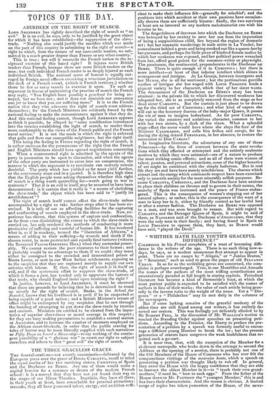TOPICS OF THE DAY.
ABERDEEN ON THE RIGHT OF SEARCH.
LORD ABERDEEN has rightly described the right of search as "an evil." It is an evil, he says, only to be justified by the great object for which it has been established—the suppression of the slave. trade. "Nothing else could justify the sacrifice which was made OD the part of this country in submitting to the right of search—a right to which, from the nature of our mercantile marine, we sub- mitted in a much greater degree than France or any other country."
This is true ; but will it reconcile the French nation to the re-
ciprocal exercise of this hated right ? It injures more British traders than French, because there are more British traders on the seas; but each individual French trader is as deeply injured as each individual British. The national sense of honour is equally out- raged by foreign naval officers exercising a vexatious jurisdiction on the deck of a French vessel, (which is French territory,) whether there be few or many vessels to exercise it upon. To such an argument in favour of maintaining the practice of search the French may reply, "You English have possibly a penchant for being an- noyed, but we have not ; and it does not diminish our annoyance one jot to know that you are suffering more." It is to the French nation that they who advocate the right of search must address themselves ; for the French Ministers are evidently forced by the national feeling to make the remonstrances against it that they do. And this national feeling cannot, though Lord ABERDEEN appears to think it possible, be allayed by "some modification introduced into the treaties establishing the right of search, to render them more conformable to the views of the French public and the French naval service." It is not the mode in which the right is enforced that galls and frets our susceptible neighbours, but the right itself.
This being the feeling in France regarding the right of search, it is rather ominous for the permanence of the right that the French and English Ministers should have opened negotiations concerning it. When a controverted right is admitted by the agents of the party in possession to be open to discussion, and when the agents of the other party are instructed to enter into no compromise, the manner in which the argument is to terminate can scarcely remain doubtful. The party which has yielded so far must yield further, or the controversy must end in a quarrel. It is therefore high time that the English people were asking themselves whether this right of search is a thing worth quarrelling for—worth going to war to maintain ? That it is an evil in itself, may be assumed to have been demonstrated : is it certain that it really is " a means of abolishing the slave-trade," the object which has been said to "justify its establishment "?
The right of search itself cannot affect the slave-trade unless
accompanied by a right to take further steps after it has been ex- ercised. It is only of use as affording facilities for the capturing and confiscating of vessels employed in the slave-trade. Now, ex- perience has shown, that this system of capture and confiscation, so far from even diminishing the extent to which the slave-trade is carried on, has only rendered the methods of conducting it more productive of suffering and wasteful of human life. It has rendered what is, as if in mockery, termed the "liberation of Africans," a means of adding to their suffering—by wounds and death if the slavers resist, by more protracted and equally fatal tortures (witness the Reverend PASCOE GRENFELL HILL) when they surrender peace- ably. We cannot restore the poor creatures to their homes ; and it probably would be no advantage to them if we could : they must either be consigned to the crowded and demoralized prison of Sierra Leone, or sent to our West Indian settlements, exposing us to the suspicion that they are captured merely to supply our own colonies with labour. If, then, the right of search is in itself an evil, and if the systematic effort to suppress the slave-trade, of which it forms a part, has tended only to aggravate the horrors of that trade, why should England insist upon retaining the right ? In justice, however, to Lord ABERDEEN, it must be observed
that there are grounds for believing that he is determined to stand up stoutly for the right of search. Snake, in the School for Scandal, knows that his livelihood is in peril if he be suspected of being capable of a good action ; and a British Minister's tenure of office might be endangered by any suspicion that he saw through the humbug of attempting to put down the slave-trade by treaties and cruisers. Ministers are entitled to he cleared from the impu- tation of superior shrewdness or moral courage in this respect ; for they are busy making preparations to establish a central station at Ascension, and to increase the number of steamers employed on the African coast-blockade, in order that the public craving for tales of horror may be more liberally supplied with such narratives as Fifty Days on board a Slave-ship—to say nothing of the contin- gent possibility of a " glorious war" to assert our right to subject ourselves and others to that " great evil" the right of search.


























 Previous page
Previous page